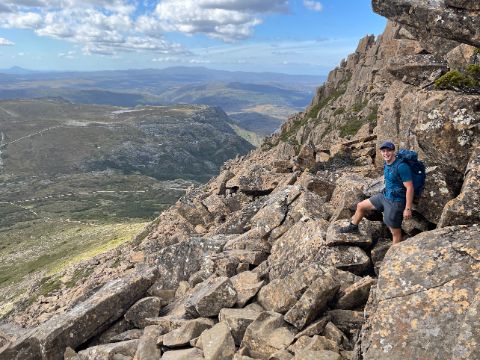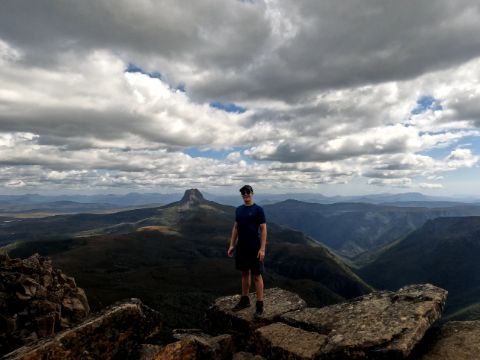- A Charles Sturt University psychology Honours student seeks participants for research to understand how people feel when participating in recreational adventure activities
- His online survey seeks their beliefs about their performance in the activity
- Activities include adventure motorcycling, BASE jumping, high-altitude mountaineering, mountain biking, rock climbing, scuba diving, skydiving, surfing and white-water kayaking and more
A Charles Sturt University psychology research student is investigating the psychological experience of engaging in recreational adventure activities.
 Fourth-year Honours research student Mr Ryland Stanmore (pictured) in the Charles Sturt School of Psychology seeks participants to complete his online survey about their experience doing adventure recreation or sports.
Fourth-year Honours research student Mr Ryland Stanmore (pictured) in the Charles Sturt School of Psychology seeks participants to complete his online survey about their experience doing adventure recreation or sports.
Mr Stanmore said adventure recreation refers to physically engaging activities initiated by individuals in natural settings and can include activities like adventure motorcycling, BASE jumping, high-altitude mountaineering, mountain biking, rock climbing, scuba diving, skydiving, surfing and white-water kayaking and more.
“These activities evoke intense bodily sensations and necessitate the development of skills to effectively navigate both perceived and actual risks that are unique to each adventure,” he said.
“I am particularly interested in understanding how people feel while participating in their activity and what beliefs they hold about their performance in the activity.”
 Mr Stanmore’s study investigates the influence of an individual’s experience level and self-confidence on achieving optimal mental states, which are known as ‘flow’ and ‘clutch’ among adventure recreation enthusiasts.
Mr Stanmore’s study investigates the influence of an individual’s experience level and self-confidence on achieving optimal mental states, which are known as ‘flow’ and ‘clutch’ among adventure recreation enthusiasts.
He explained that ‘flow’ is an optimal psychological state where an individual possesses clear goals and is confident in their abilities, has a sense of control, and is wholly engaged in the task at hand.
‘Clutch’ state is defined as heightened performance under pressure. In contrast to the exploratory mindset, effortlessness, enjoyment of movement and lack of exhaustion that characterises a ‘flow’ state, those in a ‘clutch’ state tend to have specific goals, are aware of risk and engage in effortful, challenging, and exhausting action.
For those interested in participating in the online survey, it should take no longer than 15 minutes to complete.
The survey is open to individuals who have participated in an adventure recreation activity in any geographical location.
 It seeks answers to questions about the participants’ views about their abilities in the recreational adventure activity and the psychological experiences they had during the activity.
It seeks answers to questions about the participants’ views about their abilities in the recreational adventure activity and the psychological experiences they had during the activity.
They will also be asked some brief demographic questions about their age, gender, and experience in the activity. The survey is open until Sunday 10 September 2023.
“Participants’ confidentiality is assured as their data will be stored without reference to their name or other identifying information,” Mr Stanmore said.
“If you do decide to participate, you may withdraw yourself and your data from the project at any time (prior to submitting your data at the end), without reason or consequence,” Mr Stanmore said.
As a thank you, participants will be invited to leave their email address at the end of the study to be entered in a draw to receive one of four $25AUD Amazon vouchers. Participants’ email addresses will be stored separately to their data, then deleted after the draw, and will not compromise their confidentiality.
Mr Stanmore’s research ‘How Experience and Self-Efficacy Impact the Achievement of Flow and Clutch States in Adventure Recreation’ has Charles Sturt University Human Research Ethics Committee approval.
The data collected will be presented in Mr Stanmore’s Honours dissertation and may also be presented at academic conferences or published in peer-reviewed journals.






Social
Explore the world of social